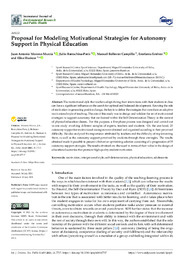Por favor, use este identificador para citar o enlazar este ítem:
https://hdl.handle.net/11000/38445Registro completo de metadatos
| Campo DC | Valor | Lengua/Idioma |
|---|---|---|
| dc.contributor.author | Moreno-Murcia, Juan Antonio | - |
| dc.contributor.author | Barrachina-Peris, Julio | - |
| dc.contributor.author | Ballester-Campillo, Manuel | - |
| dc.contributor.author | Estévez, Estefanía | - |
| dc.contributor.author | Huéscar Hernández, Elisa | - |
| dc.contributor.other | Departamentos de la UMH::Psicología de la Salud | es_ES |
| dc.date.accessioned | 2025-11-24T12:40:22Z | - |
| dc.date.available | 2025-11-24T12:40:22Z | - |
| dc.date.created | 2021-07 | - |
| dc.identifier.citation | International Journal of Environmental Research and Public Health, Vol. 18, Nº14 (2021) | es_ES |
| dc.identifier.issn | 1660-4601 | - |
| dc.identifier.issn | 1661-7827 | - |
| dc.identifier.uri | https://hdl.handle.net/11000/38445 | - |
| dc.description.abstract | Themotivational style that teachers adopt during their interactions with their students in class can have a significant influence on the search for optimal and balanced development. Knowing the role ofmotivation in generating positive change, the key is to define the strategies that constitute an adaptive motivational style of teaching. The aim of this study was to design and validate the set of motivational strategies to support autonomy that are framed within the Self-Determination Theory in the context of physical education classes. For this purpose, a five-phase process was designed and carried out in one study involving different samples of experts, teachers and students. On the one hand, 25 autonomy-supportive motivational strategies were obtained and organized according to their perceived difficulty. We also analyzed the importance attributed by teachers and the difficulty of implementing them, as well as the autonomy support perceived by students through these strategies. The results obtained made it possible to present a behavior-optimizing solution consisting of a progression of 25 autonomy support strategies. The results obtained are discussed in terms of their value in the design of educational scenarios that promote high-quality student motivation. | es_ES |
| dc.format | application/pdf | es_ES |
| dc.language.iso | eng | es_ES |
| dc.publisher | MDPI | es_ES |
| dc.rights | info:eu-repo/semantics/openAccess | es_ES |
| dc.rights | Attribution-NonCommercial-NoDerivatives 4.0 Internacional | * |
| dc.rights.uri | http://creativecommons.org/licenses/by-nc-nd/4.0/ | * |
| dc.subject | Motivation | es_ES |
| dc.subject | Interpersonal style | es_ES |
| dc.subject | Self-Determination | es_ES |
| dc.subject | Physical education | es_ES |
| dc.subject | Adolescents | es_ES |
| dc.title | Proposal for modeling motivational strategies for autonomy support in physical education | es_ES |
| dc.type | info:eu-repo/semantics/article | es_ES |
| dc.relation.publisherversion | https://doi.org/10.3390/ijerph18147717 | es_ES |

Ver/Abrir:
18ijerph-18-07717-v2.pdf
645,74 kB
Adobe PDF
Compartir:
 La licencia se describe como: Atribución-NonComercial-NoDerivada 4.0 Internacional.
La licencia se describe como: Atribución-NonComercial-NoDerivada 4.0 Internacional.
.png)